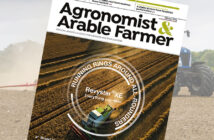Despite some positive announcements in the Chancellor’s Spring Budget, the NFU feels it still falls short of providing the stability the farming sector needs.
The NFU wrote to the Chancellor ahead of the Spring Budget urging the government to deliver support to help deal with increasing volatility and build stability. The letter also raised concerns on the possibility of a £300 million tax raid on holiday lets.
With it confirmed that tax reliefs for Furnished Holiday Lettings (FHLs) are to be abolished the NFU will strongly oppose the plans, as it did in 2009.
“Agricultural businesses are facing a challenging economic backdrop, with input costs at persistently high levels and at least a 50% reduction in direct farm payment support due this year,” said NFU President Tom Bradshaw.
“The announcement on the abolition of the Furnished Housing Letting regime is a significant concern as it’s an important source of diversification for farm businesses which underpins resilience. We will be looking to engage further with Treasury on this announcement.”
Mr Hunt also announced plans to abolish Multiple Dwellings Relief, with guidance suggesting there will be engagement ‘with the agricultural industry to determine if there are any particular impacts for the sector that should be considered further’.
Farm businesses gained an important reassurance on the tax treatment of land entered into environmental land management schemes, when guidance accompanying the Budget said that APR (agricultural property relief) from inheritance tax would be extended from April 2025.
In its response to a consultation last year, the NFU had stressed that was a key ask to prevent undermining the uptake of ELMs, and the government’s wider environmental aspirations.
“We welcome the government backing the NFU’s call for the extension of APR to land in Environmental Land Management schemes as it will remove a barrier of entry for a number of farm businesses and give farmers more choice about how to use their land,” Mr Bradshaw added.
“But the extension of this beyond ELMs may have an adverse impact on food production and farm tenancies and we will work with the Treasury to assess those implications.”
Defra said the changes also remove a significant barrier to tenant farmers and landlords collaborating to enter schemes by removing the risk that tenants’ participation in schemes would change whether the land is eligible for Agricultural Property Relief.
The new policy design will include the following main features:
- Extended relief will be available for lifetime transfers and transfers at death on or after April 6, 2025.
- Relief will be available for land managed under an environmental agreement with, or on behalf of, the UK Government, Devolved Administrations, public bodies, local authorities, or approved responsible bodies.
- Relief will be available where there is an agreement in place for the environmental land management scheme on or after March 6, 2024. This includes an agreement entered into before 6 March 2024 if it remains in place on or after March 6, 2024.
- Relief will continue to be available where an agreement has concluded if the land continues to be managed in a way that is consistent with that agreement.
- Relief will only apply where the land was agricultural land for at least 2 years immediately prior to the land use change. There will not be a need to show the land was used for agricultural purposes and would have qualified for agricultural property relief before land use change. HMRC will provide guidance on the necessary evidence in due course.
- The existing holding period for agricultural property relief will not be restarted by land use change. This means, for example, if an owner-occupier had occupied agricultural land and used it for agricultural purposes for 2 years or more then converting a parcel of the same land to environmental use will not require the land to be held for a further 2 years to qualify for relief.
- The valuation of the qualifying land will be the market value of environmental land subject to the special assumption of a restriction to its existing use.
- Consistent with the current rules, buildings used in connection with environmental land, including farmhouses, will qualify for relief where that building is occupied with, and that occupation is ancillary to, environmental land.
- Implementing commitments in response to the Rock Review, the Government will remove barriers and improve tenant farmers’ access to schemes, with the aim of incentivising more longer term tenancy opportunities where landlords and tenants collaborate to share the benefits of our longer term environmental schemes.
Environment Minister Rebecca Pow said: “Now we are going further, as announced in the 2024 Budget, land used as part of ELM will now be in scope for Agricultural Property Relief, meaning this land is eligible to be passed on free of Inheritance Tax.
“It pays to be part of ELM and we will continue to support our farmers and landowners to improve and conserve the natural environment alongside food production. I would also encourage farmers to take another look at some of the longer-term investment decisions such as tree planting in light of this announcement.”




